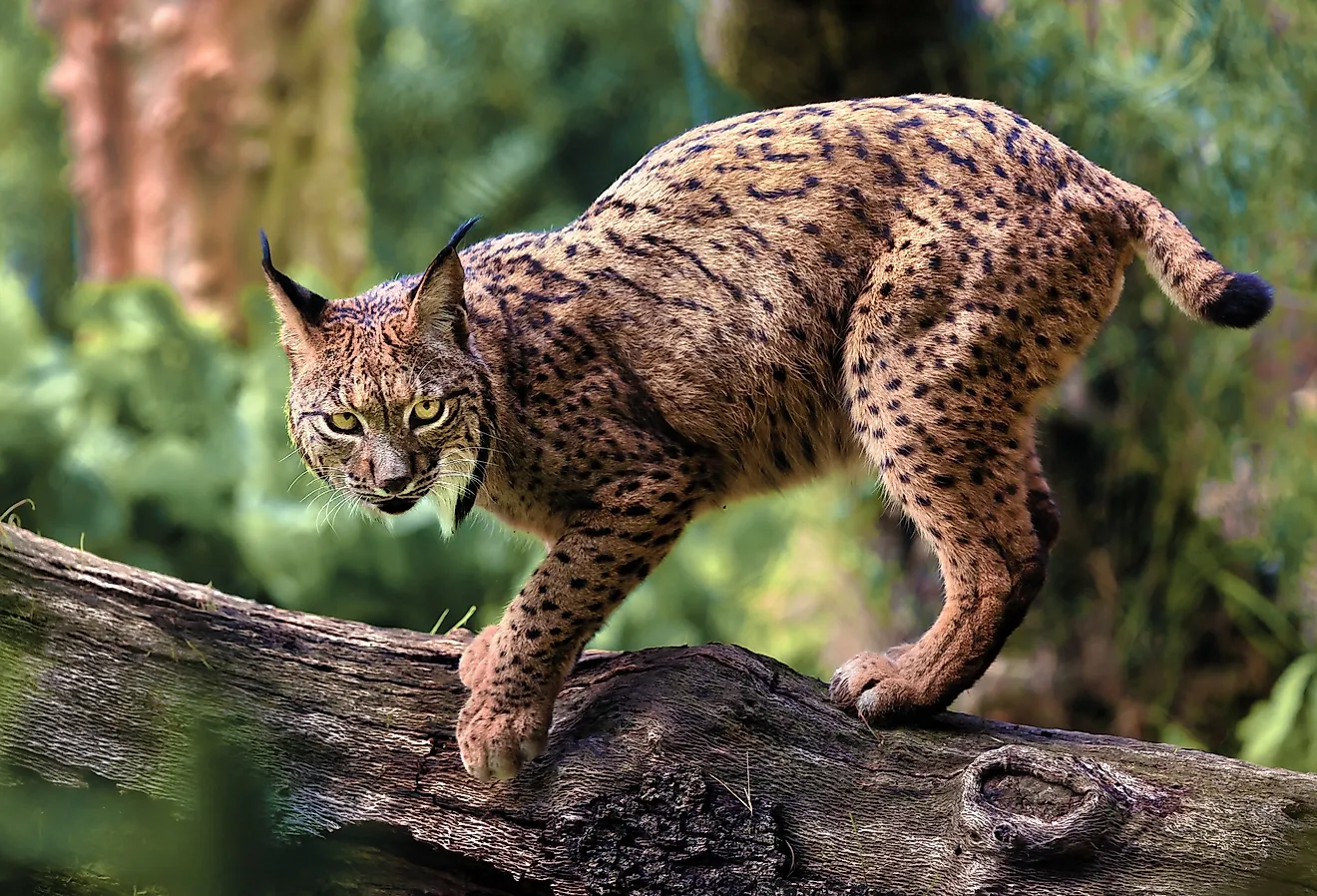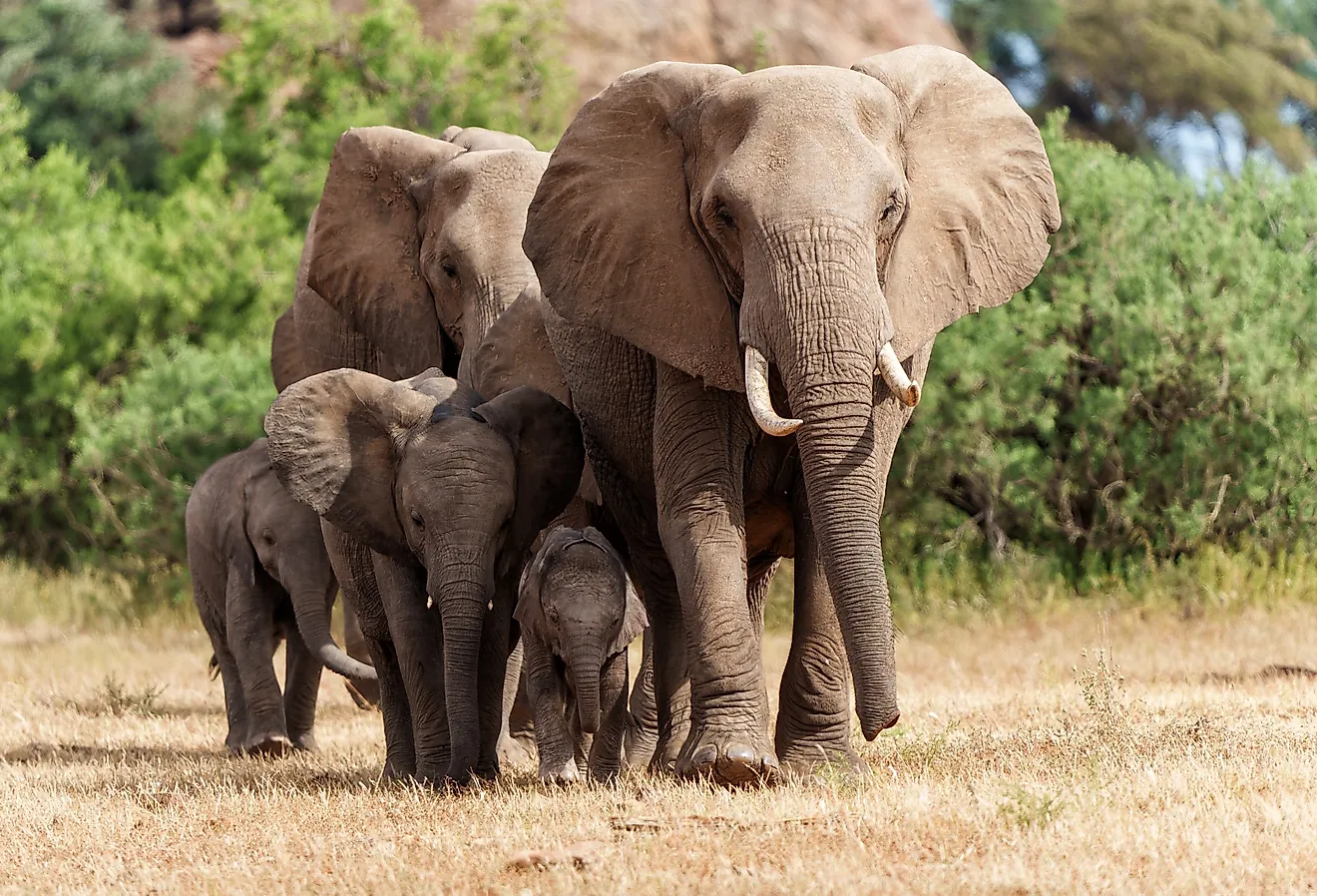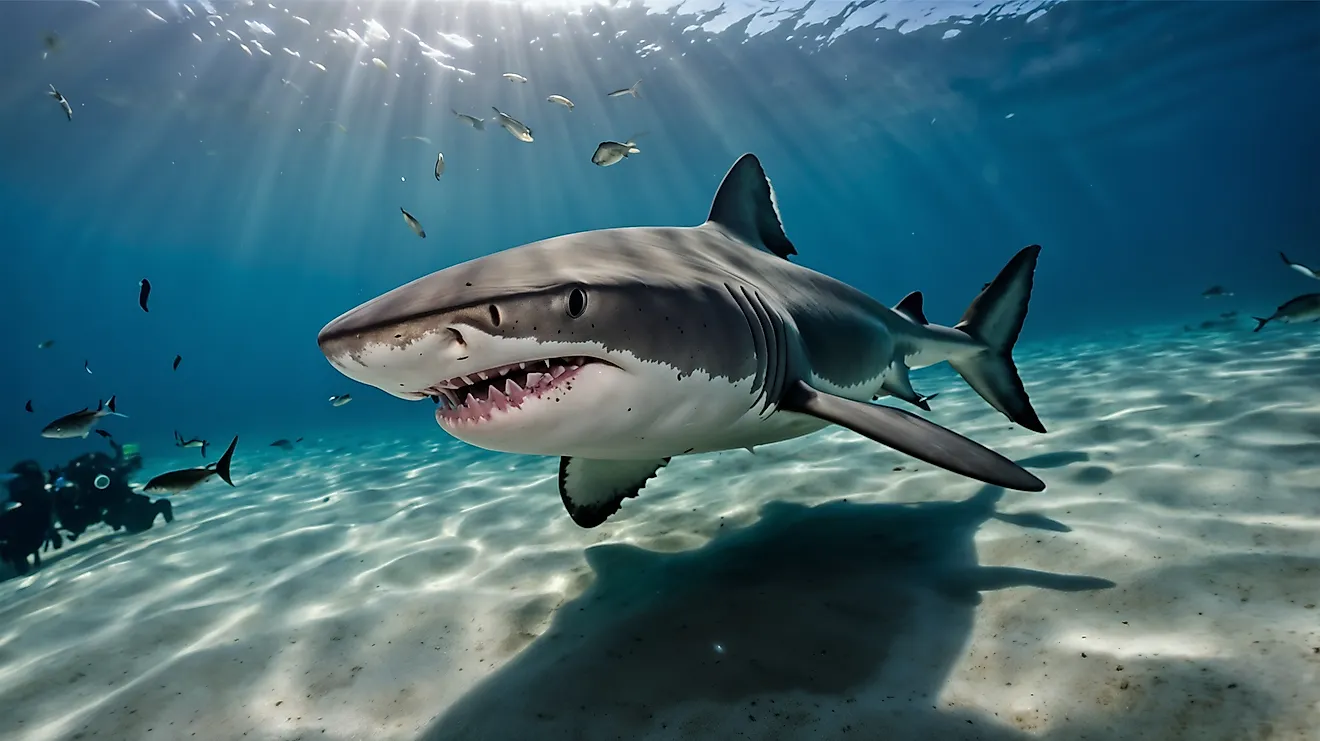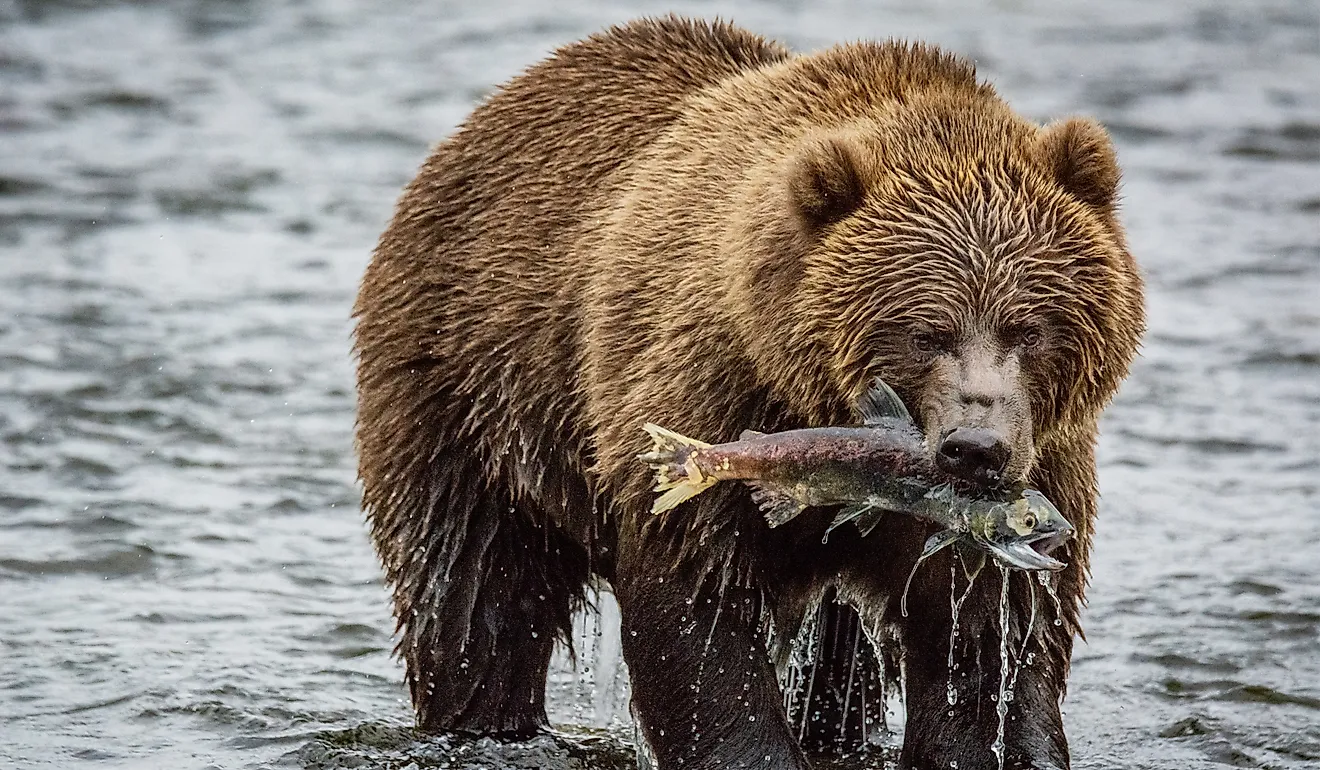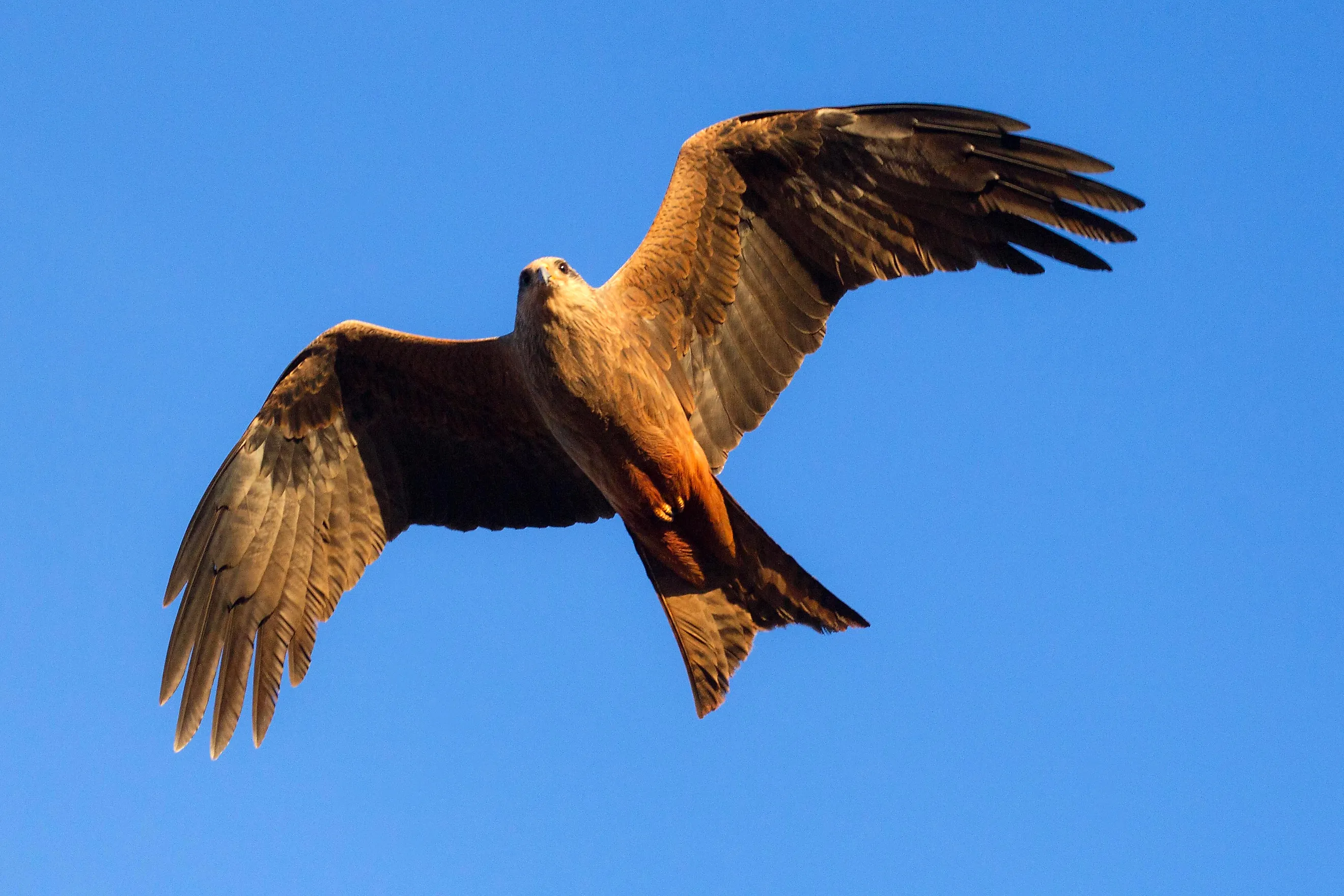
The World’s Largest Eagles
Eagles are living symbols of power and majesty, dominating skies across every continent except Antarctica. Among these raptors, a select few truly tower above the rest, having extraordinary wingspans that stretch over eight feet! Wedge-tailed eagles, Martial eagles, and Steller sea eagles are the largest in the world, with wingspans reaching up to 2.84 m (9 ft 4 in), 2.6 m (8 ft 6 in), and 2.45 m (8 ft 2 in), respectively.
In this comprehensive list of the largest eagles in the world, you’ll discover fascinating details about each species’ habitat, diet, and conservation status, from Australia’s wedge-tailed eagle with its incredible nine-foot wingspan to the heavyweight Steller’s sea eagle of coastal Asia.
The World's Largest Eagles By Wingspan
10. Steppe Eagle - 2.1 m (7 ft 1 in)
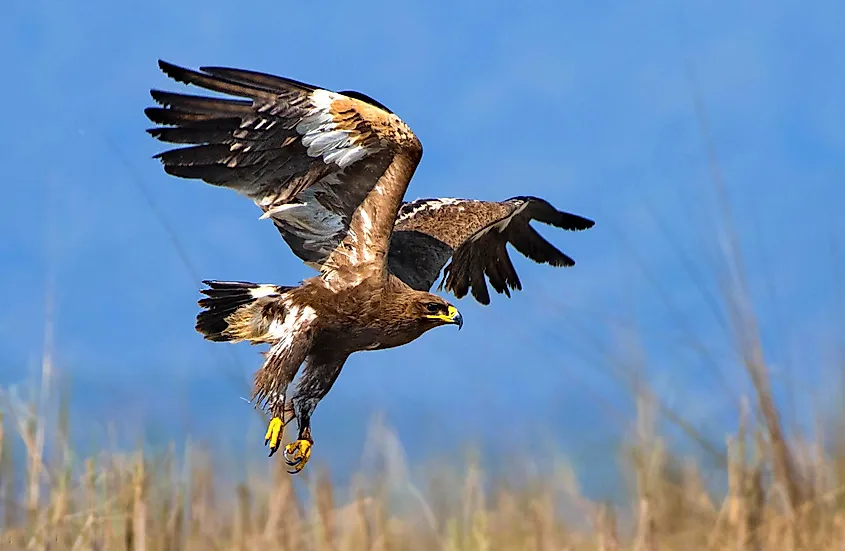
The steppe eagle (Aquila nipalensis), a distinctive member of the "booted eagles" group, features well-feathered legs. Previously linked closely to the tawny eagle, this species specializes in preying on ground squirrels, small mammals, and occasionally other prey in its steppe habitats. Uniquely, it nests in relatively treeless landscapes, relying heavily on ground squirrels.
Annually, steppe eagles undertake significant migrations along key routes through the Middle East, the Red Sea, and the Himalayas. Despite being abundant during migration, their population is rapidly declining by over 50% due to threats like steppe fires, climate-induced pests affecting nesting success, human-related habitat disturbances, persecution, and electrocution from power lines, leading to their classification as endangered by IUCN.
9. Imperial Eagle - 2.1 m (7 ft 1 in)
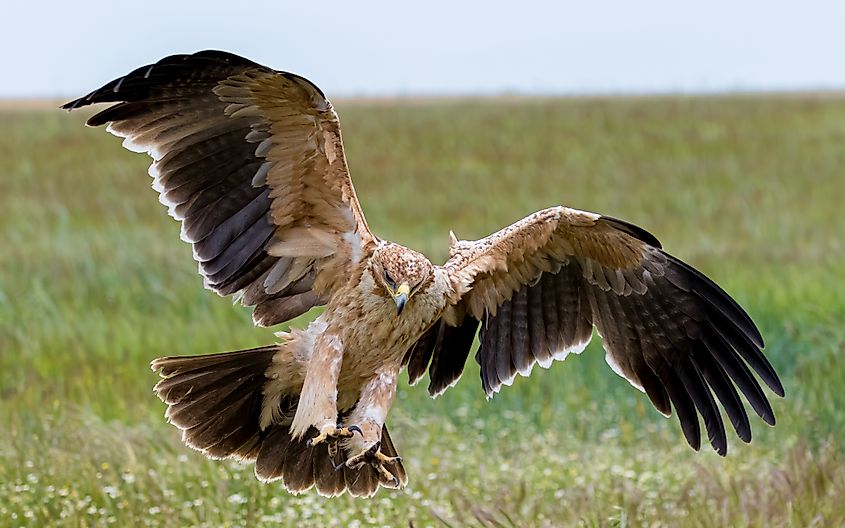
The Eastern Imperial Eagle (Aquila heliaca), first described in 1809, is a valued natural species predominantly found in Hungary and Slovakia. This eagle, part of the Accipitridae family and Aquilinae subfamily, exhibits slight sexual dimorphism with females being bulkier than males. Its habitat spans across Eurasian steppes from the Caucasus to Lake Baikal, but it primarily breeds in the Carpathian Basin, including countries like Hungary, Austria, and Romania.
Under considerable conservation efforts since the 1970s due to near extinction, the species is now strictly protected under several international agreements, including the EU Birds Directive and CITES. It predominantly nests in lower mountain valleys or grasslands rich in suslik populations, adapting its nesting sites in response to human disturbance. The imperial eagle primarily feeds on small mammals like susliks and hamsters, and it adjusts its migration patterns based on winter conditions, with younger birds more likely to migrate or wander.
8. Philippine Eagle - 2.2 m (7 ft 3 in)
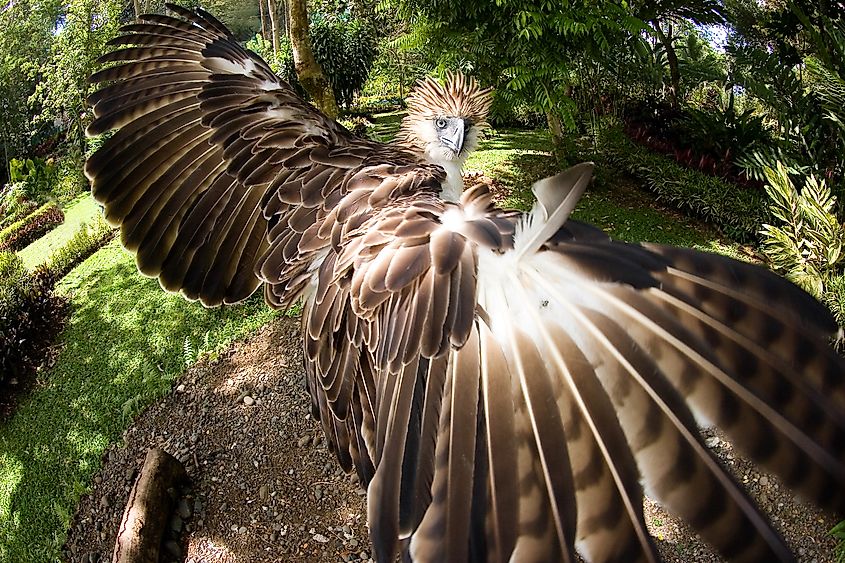
The Philippine eagle (Pithecophaga jefferyi), also known as the monkey-eating eagle, is critically endangered and endemic to the Philippines. It is considered the largest eagle in terms of length and wing surface area. The eagle has distinctive brown and white plumage, a shaggy crest, and measures between 86 to 102 cm in length, with a wingspan ranging from 184 to 220 cm. It primarily inhabits dipterocarp and mid-montane forests across four major Philippine islands: Luzon, Samar, Leyte, and Mindanao, with the largest population on Mindanao.
The species faces severe threats from deforestation, leading to a declining population that has placed it under the "Critically Endangered" category on the IUCN Red List. The Philippine eagle is a national symbol, appearing on the country's 1000-peso note and protected under law, with penalties for killing one including heavy fines and imprisonment. Its diet is versatile, primarily consisting of small to medium-sized animals and, historically, it was believed to prey mainly on monkeys.
7. Harpy Eagle - 2.24 m (7 ft 4 in)
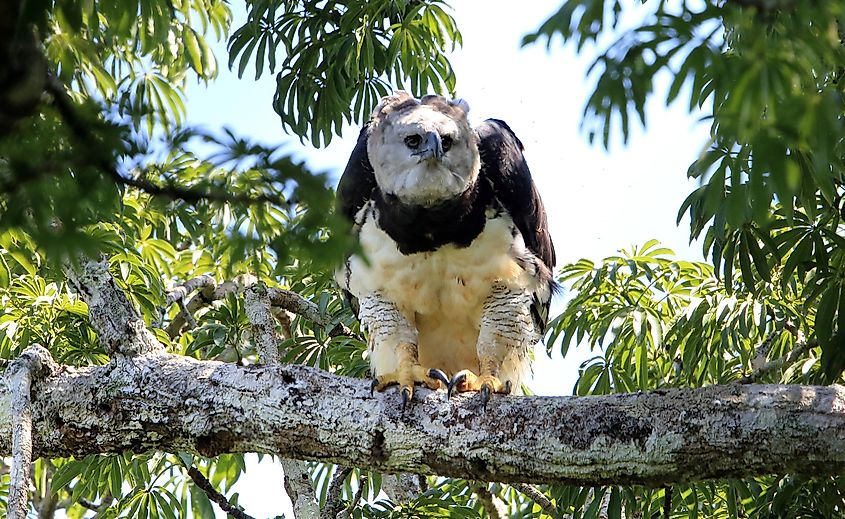
The harpy eagle (Harpia harpyja), also known as the American harpy eagle, is one of the largest and most powerful eagles globally. Identified by Carl Linnaeus in 1758, this neotropical bird is distinguished by its slate-black feathers on the upperside and mostly white underside, with a distinct black band across the upper breast. Found from southern Mexico through Central and South America to Argentina, it prefers tropical lowland rainforests in the emergent canopy layer.
Due to habitat destruction, primarily from logging, it has become rare and is nearly extirpated in much of Central America. Harpy eagles weigh between 6 and 9 kg, with females generally larger than males, and have a wingspan ranging from 176 to 224 cm. Despite their size, their wings are broad but shorter than other large eagles, adapting them for maneuverability in dense forest environments. Vocal mainly near their nests, harpy eagles produce a range of sounds from wails to rapid chirps.
6. American Bald Eagle - 2.3 m (7 ft 7 in)
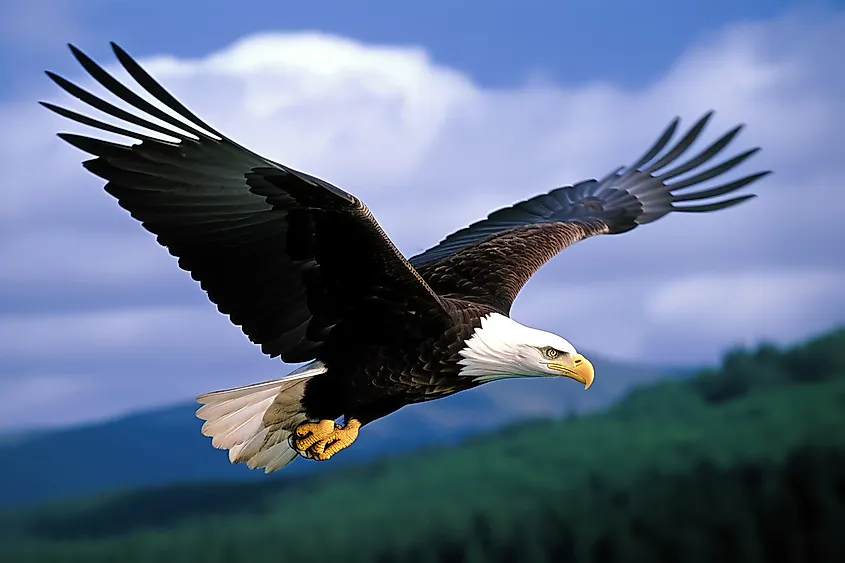
The bald eagle (Haliaeetus leucocephalus), North America's renowned bird of prey, is notable for its impressive wingspan, ranging between 1.8 and 2.3 meters. Found across most of Canada, all contiguous United States, and northern Mexico, this eagle is an opportunistic feeder, primarily consuming fish.
Known for building the largest nest of any North American bird, the adult is easily recognizable by its white head and tail against a darker body, despite its misleading name suggesting baldness, which historically means "white-headed." This species, symbolizing the United States, has rebounded from near extinction due to conservation efforts, including the banning of DDT and protections against hunting, leading to its removal from the endangered species list in 2007.
5. Golden Eagle - 2.34 m (7 ft 8 in)
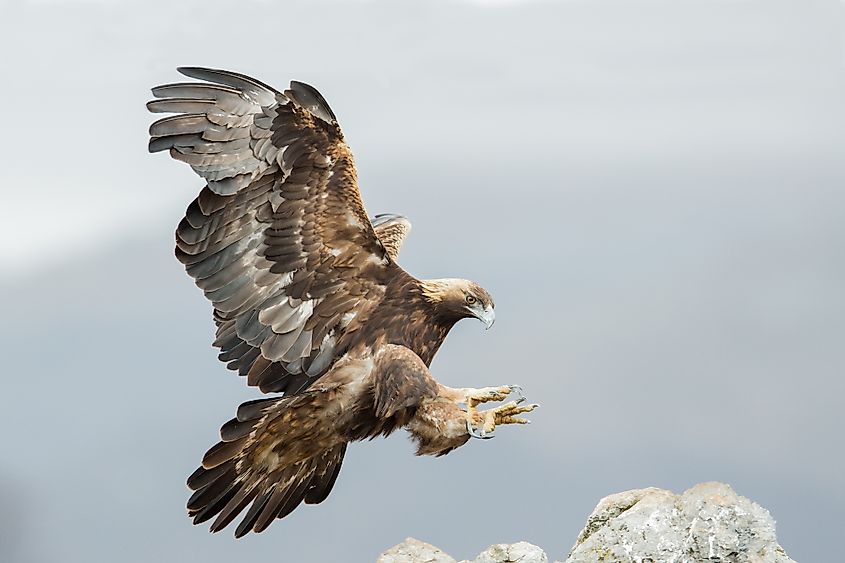
The golden eagle (Aquila chrysaetos) is a large raptor found across the Northern Hemisphere, making it the most widely distributed species of eagle. Recognized for its impressive wingspan of 1.8 to 2.34 meters, the golden eagle features dark brown plumage with lighter golden-brown on its nape. This bird of prey excels in speed and agility, utilizing powerful feet and sharp talons to hunt various ground-dwelling animals.
Golden eagles are known for their large home ranges and build their nests in high places like cliffs. They are monogamous, often mating for life, and engage in breeding primarily in the spring. Despite their wide distribution, golden eagles have been extirpated from many areas heavily populated by humans but remain a prominent species in remote regions of Eurasia and North America.
4. White-Tailed Eagle - 2.45 m (8 ft)
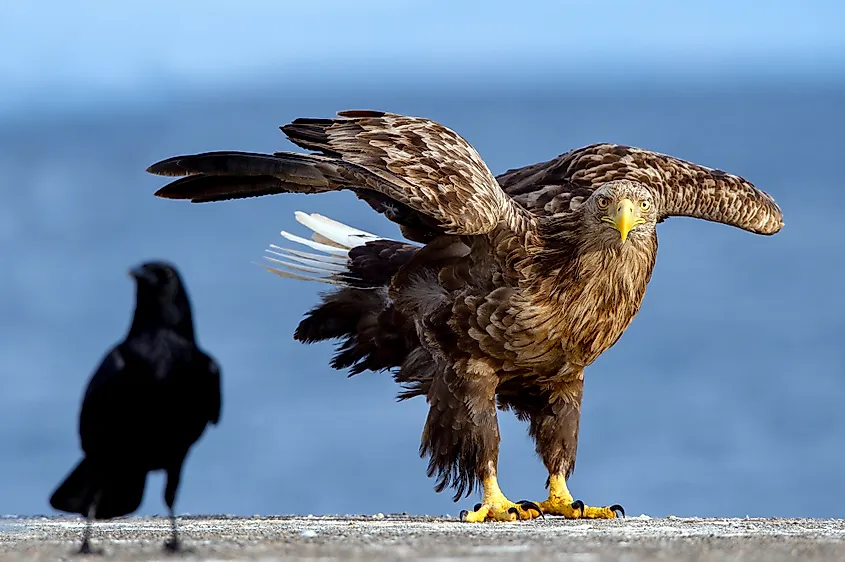
The white-tailed eagle (Haliaeetus albicilla), also known as the sea eagle, is one of the largest eagles globally, widely distributed across temperate Eurasia. This species is renowned for its significant wingspan, ranging from 1.78 to 2.45 meters, making it one of the largest among eagles. It thrives near large bodies of water like coastal areas and inland lakes, requiring old-growth trees or cliffs for nesting.
Despite historical declines due to habitat destruction, persecution, and chemical poisoning, conservation efforts have led to a recovery in some regions. The white-tailed eagle, an apex predator and opportunistic scavenger, primarily feeds on fish and water birds. It is closely related genetically and ecologically to the bald eagle of North America, with both species sharing similar ecological niches in their respective continents.
3. Steller's Sea Eagle - 2.45 m (8 ft 2 in)
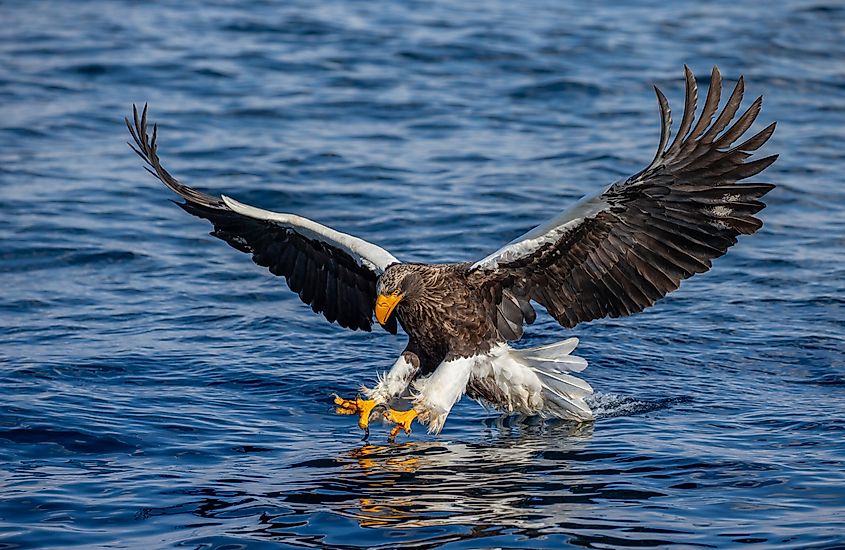
Steller's sea eagle (Haliaeetus pelagicus), known for its striking yellow beak and talons, is one of the largest raptors with a significant wingspan ranging from 1.95 to 2.50 meters. It is primarily found in coastal northeastern Asia, including Russia, Korea, Japan, China, and Taiwan, and preys mainly on fish and water birds.
Recognized as the heaviest eagle, typically weighing between 5 to 10 kg, the Steller's sea eagle is often larger than the harpy and Philippine eagles. This species, listed as vulnerable, faces risks primarily from habitat loss and environmental contamination. It is distinctive for its dark brown plumage with contrasting white wings and tail, with no recognized subspecies. Steller's sea eagle is crucial for conservation due to its limited and fragmented population, mainly concentrated on the Kamchatka Peninsula.
2. Martial Eagle - 2.6 m (8 ft 6 in)
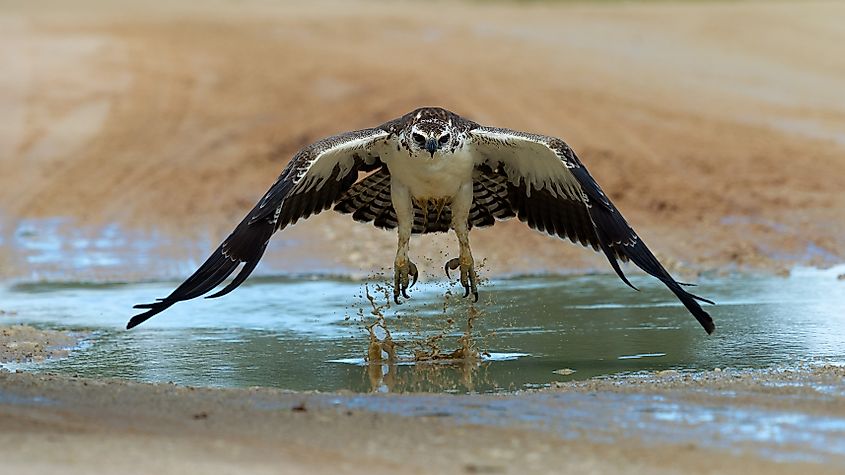
The martial eagle (Polemaetus bellicosus), native to sub-Saharan Africa, is one of the largest and most powerful booted eagles with a wingspan ranging from 188 to 260 cm. Recognized for its dark brown plumage and notable hunting skills from high soars, this species prefers the wooded belts of open savanna.
Although it has a substantial range across Africa, the martial eagle faces threats from habitat destruction and persecution for preying on livestock and game, contributing to its classification as Endangered by the IUCN. This species stands out for its significant size, being one of the heaviest and broadest-winged eagles in the region.
1. Wedge-tailed Eagle - 2.84 m (9 ft 4 in)
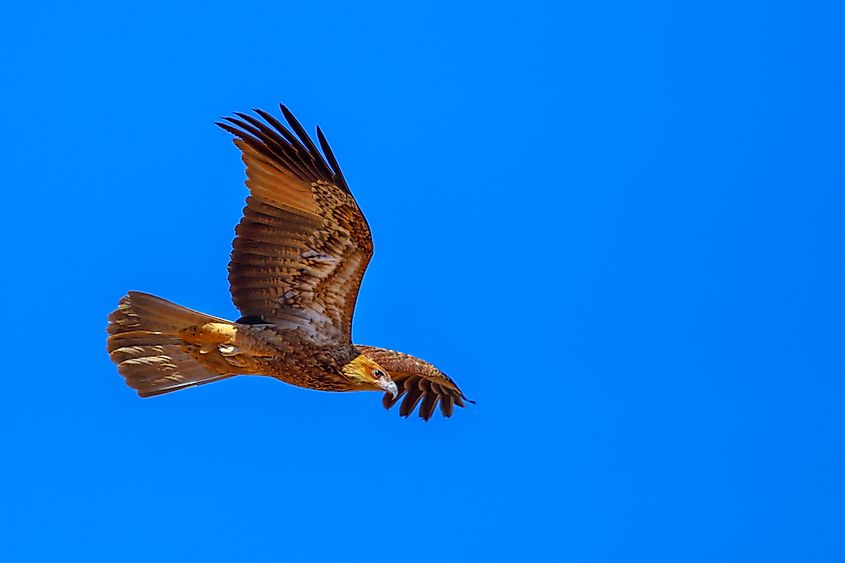
The wedge-tailed eagle (Aquila audax), also known as the eaglehawk, is Australia's largest bird of prey and is notable for its broad wings, fully feathered legs, and distinctive wedge-shaped tail. It is prevalent throughout Australia and parts of southern New Guinea, adapting to diverse habitats from rainforests to mountainous and desert regions. This species is a powerful predator that primarily feeds on mammals like rabbits and marsupials, though it also consumes birds, reptiles, and carrion. The wedge-tailed eagle forms lasting pairs and builds large stick nests where it typically lays two eggs.
Historically persecuted for allegedly preying on livestock, its population has rebounded, partly due to increased food sources like roadkill. The wedge-tailed eagle has a wingspan up to 2.84 meters, making it one of the largest eagles globally. It is genetically similar to the Aquila genus members, specifically sharing close relations with Verreaux's and Gurney's eagles, and forms part of a clade that includes the golden eagle.
The World's Largest Eagles By Weight
Eagles are symbols of freedom and strength, with some species standing out for their significant weight. The martial eagle, Africa's largest, weighs between 6.6 and 13.6 pounds and dominates the African skies. In contrast, the white-tailed eagle found across Europe, and Asia tips the scales between 6.8 and 15.2 pounds, feeding on a varied diet, including fish and small mammals.
The critically endangered Philippine eagle weighs between 10 to 18 pounds. Found only in the Philippines, it faces threats from deforestation and human activity, with only about 500 individuals remaining. The harpy eagle, residing in the Central and South American rainforests, shows a striking sexual dimorphism in weight, with females reaching up to 20 pounds, far outweighing the males.
The heaviest of all is the Steller's sea eagle, ranging from 11 to 20 pounds. This eagle inhabits coastal northeastern Asia, embodying the wildness of its natural environment. These species highlight the diversity and adaptability of eagles globally, ruling their respective territories with formidable prowess.
